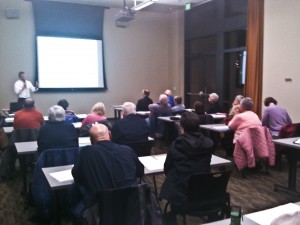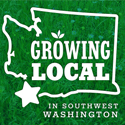The City of Vancouver is considering a new way to pay for transportation system upgrades, and is looking to Vancouver’s Neighborhood Traffic Safety Alliance for input and grassroots support.
At the Neighborhood Traffic Safety Alliance (NTSA) meeting Feb. 21, Vancouver’s long-range planning manager, Matt Ransom, acquainted NTSA citizen volunteers with a funding paradigm known as a Transportation Benefit District.

Matt Ransom addresses public neighborhood meeting to discuss new ways to fund transportation upgrades.
City officials would not be permitted to use TBD funds for general transportation operations and maintenance.
Seattle has been supporting improvements to its transportation infrastructure using TBDs since 1987. In 2005 and 2007 the Washington State Legislature amended the TBD statute to expand its potential uses and its authority to generate revenue, including the ability to authorize a $20 annual licensing fee for every motorized vehicle registered within the established district.
Vancouver’s TBD plans, as initially proposed by former Transportation Policy Director Thayer Rorabaugh, include a similar $20 provision.
This is the part of the TBD funding model that members of Vancouver’s NTSA find most troubling. After seeing the cash-strapped vehicle owners of Seattle pay $20 per year since 2005, they are reticent to burden the citizens of Vancouver with a similar fee.
NTSA member and representative of the Marrion Neighborhood Association Charlie Stemper questioned the wisdom of pursuing these kinds of funding options in the current economic climate. “The timing isn’t appropriate,” Stemper said.
In response, Ransom said funding for Vancouver’s TBDs would likely come from a wide variety of comprehensive sources including property taxes and state and federal grants. He went on to stress the city’s commitment to transparency and community involvement, insisting that the NTSA would be an integral part of the process as specific TBD proposals begin to move forward.
The Vancouver community does, in fact, have some legal control over the potential development of TBDs. State statues allow citizens to stop the formation of a TBD by using a Declaration of Termination.
If more than 60 percent of property owners within the affected district sign a petition stating their disapproval, the TBD would be considered officially overturned by the body politic. Taking a close look at this provision, certain members of the NTSA objected to what they see as a complete disenfranchisement of individuals who rent or who are otherwise not considered lawful owners of real estate.
The vast majority of NTSA committee members, however, seem open to learning more about TBDs. Most were extremely dismayed by Ransom’s news that transportation improvements currently rank quite low on Vancouver’s operational to-do list.
Focusing chiefly upon adequately supporting police, fire, and parks departments, the City Council will likely find precious little in the coffers to devote to large-scale transportation improvements. With an estimated $500 million worth of transportation needs looming on the horizon, creative sources of additional revenue are certainly necessary.









